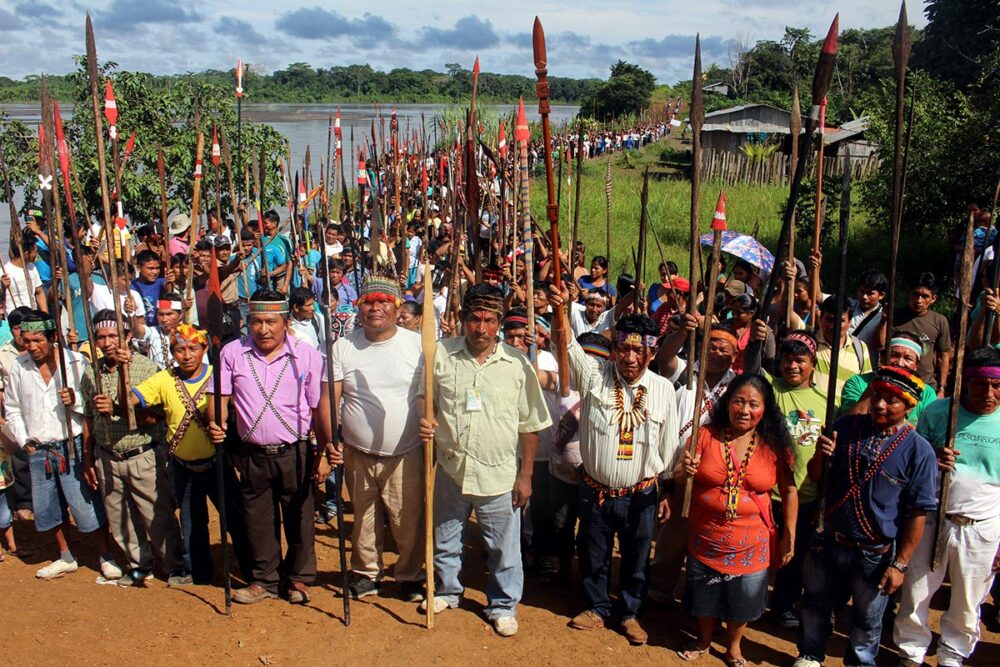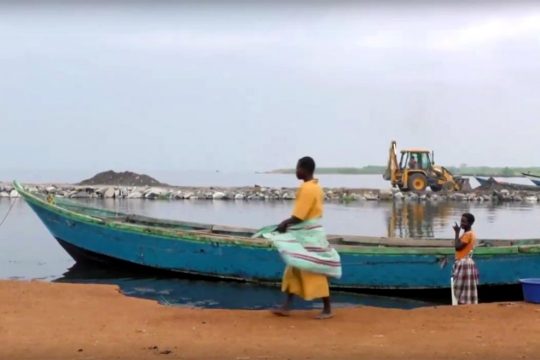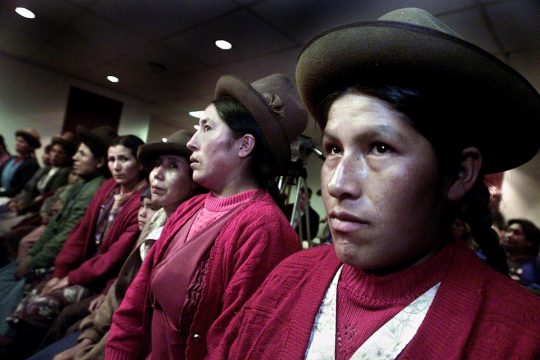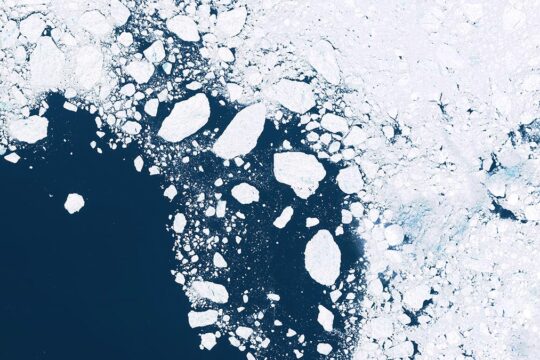“It is a very special moment”, comments Robinsón Sandi Hualinga, president of the Organisation of Amazonian Kichwa Indigenous Peoples of the Peru-Ecuador Border Region (Opikafpe) to Justice Info. “We are contaminated, and when the company asked, ‘How do you know you're contaminated?’, there had to be proof, saying that the party responsible for this contamination is the company Pluspetrol. For us, it is a very joyful moment to receive this [final statement], because we know that we now have a tool to follow a path in any process that may come in the future.”
According to a final statement published on September 3 by the Dutch contact point of the Organisation for Economic Co-operation and Development (OECD) Guidelines for Responsible Business Conduct, the oil company Pluspetrol has violated the rights of the environment and of indigenous people in its operations in the Peruvian Amazon, where Sandi Hualinga’s community lives. Over 5 years after a claim was presented by four indigenous federations against the oil company, the Dutch statement has added another non-judicial piece to efforts to hold companies to account for the impact of their actions.
The first OECD Guidelines were adopted in 1976, and there have been many revisions since. These guidelines are soft laws that the governments joining the organisation address to the companies operating in or from their countries. They cover a variety of areas, including human rights, labour rights, environment, bribery, disclosure, and taxation. 52 states worldwide adhere to them and are required to set up a national contact point. These local offices are responsible, among other tasks, for contributing to solve controversies when companies are allegedly not complying with the guidelines. The Dutch national contact point (NCP) is composed of four members who are independent from the government.
The largest onshore oil field in Peru
A submission to the Dutch national contact point was sent in March 2020 by four Peruvian indigenous federations supported by four NGOs, two from Peru and two from the Netherlands, against Pluspetrol. The oil and gas private company is owned by two Argentine families and has subsidiaries extracting fossil fuels in several South American countries, including Argentina, Ecuador, and Peru. However, its headquarters are in the Netherlands, where it is known as a letterbox company, meaning that it has an address but has no ongoing operation there. The indigenous groups claimed that the company was not respecting their human rights, environment and health during its operation on Lot 1AB (now renamed Lot 192), in the Loreto region on the northern Peruvian border with Ecuador. The area, around 500,000 hectares of rain forest, was first drilled for oil in 1971 and quickly became the largest onshore oil field in the country, and has long been one of the most prolific. Pluspetrol acquired the lot in 2000 and left in 2015.
The Indigenous federations represent around 25 communities of the Peruvian Amazon, the Achuar, Kichwa, Kukama, and Quechua people, impacted by the contamination. “Pluspetrol failed to conduct appropriate due diligence to identify its existing impacts and prevent new ones, leading it to cause and contribute to the contamination of at least 1,963 sites with spilled oil, industrial waste, and other pollution from industrial oil extraction,” reads in the original 2020 complaint. “This complaint alleges that the contamination has caused serious environmental impacts and that it is linked to adverse health impacts in local indigenous populations, ranging from high blood concentrations of carcinogenic metals such as cadmium and lead, to other potential health conditions.” The Amazon communities also claimed that Pluspetrol left without complying with the OECD Guidelines and remediating the contamination it caused.
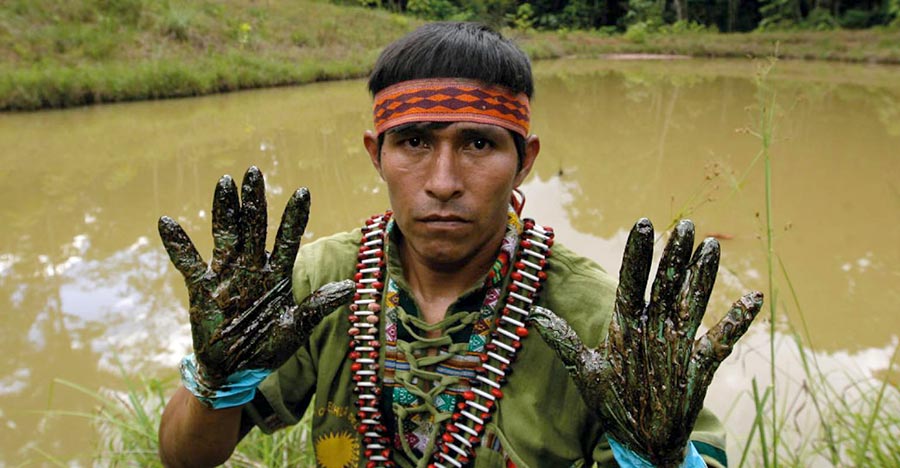
The problem for Pluspetrol
In its final statement, the Dutch national contact point affirmed that Pluspetrol did not act in line with the respect of human rights and “did not do enough to prevent and address adverse environmental impacts resulting from its activities,” and therefore it “did not do enough to respect the right to health”. The statement also concluded that the company's remediation was not in line with its guidelines. It recommended that Pluspetrol “raise the level of environmental performance in all parts of its operations by applying international best practices,… seek to provide remediation to the greatest extent possible,” and fix the impact caused by its predecessor.
The oil company is recommended to “consult and engage with impacted communities in the design and planning of any remediation activities, in a meaningful way that ensures their free, prior and informed consent is obtained,” which is an indigenous peoples’ right. The final statement also invited Pluspetrol to “disclose information on its corporate structure, operations, ownership and annual accounts for both the parent company as well as its subsidiaries”.
Companies found in breach of the OECD Guidelines may be excluded from trade promotion, export credit, and public procurement contracts under Dutch government policies. But the recommendations contained in the report are not binding. “As a non-judicial mechanism, the NCP cannot enforce, and hence, cannot make sure that recommendations are respected by the company. But by making the conclusions and recommendations public, other actors (NGO’s, investors, governments, etc.) can put pressure on a company to respect the recommendations made by the NCP,” says the Dutch office reached by Justice Info. In one year, they will follow up on their report and evaluate whether the recommendations have been implemented.
The problem for Peru
Asked for a reaction, Pluspetrol wrote back that it “engaged constructively and in good faith with the NCP process, providing substantial documentation and cooperating fully with the NCP throughout the review. The Company strongly believes the complaint is without merit and that the Final Statement does not fully reflect the breadth and complexity of the evidence presented and the extent of actions taken by the Company”. It added that “many of the issues raised by the recommendations in the Final Statement have already been addressed by Pluspetrol and the Company continues to strengthen its environmental management systems, reinforce its human-rights due-diligence processes and enhance transparency across its operations.”
Indigenous leader Sandi Hualinga says that “deep down, what we want is for Pluspetrol to take responsibility, to acknowledge the environmental crime they committed in our lands. What we want is for it to be cleaned up, because we are living with that contamination”. He denounces the silence of the Peruvian state, which allowed the company to work in the area.
Since 2022, Peru has been a candidate to join the OECD. “How can a country that has let this happen be part of the organisation?” asks Yaizha Campanario Baqué, who has worked as an advisor for the Indigenous federations for over 10 years and has worked on the complaint to the Dutch contact point. “This case shows that Peru does not have enough good environmental and human rights standards, or the capacity to enforce companies to comply with those.”
Think about it, letterbox companies
The fact that the statement is not binding is “frustrating,” says Campanario Baqué. “But after so many years where the company always denied its responsibility towards the environmental damage it left, having a neutral, independent body from a European country say that the company is actually responsible for that, it is very good,” she continues. “I think there's a sense of justice.”
She hopes that it has some deterrence effect on companies coming after Pluspetrol. None of the companies that worked in the area before and after Pluspetrol cleaned up the pollution. “Everyone knows that if the previous company left and nothing happened to them, then I can just do the same. I will just take all the benefits and don't invest anything in prevention or remediation,” says Campanario Baqué. “This report gives the message that you cannot just leave with impunity, without any consequence.”
“It was the first complaint that the Dutch national contact point accepted against a mailbox company”, highlights Campanario Baqué. “That also opens up the conversation for so many mailbox companies and mining and oil companies that are also affecting local communities and indigenous peoples elsewhere.”
The tip of the business iceberg
Joseph Wilde-Ramsing is the advocacy director at SOMO, the Centre for Research on Multinational Corporations, one of the two Dutch NGOs involved in the submission. He and the indigenous leaders went to Pluspetrol’s headquarters in Amsterdam after the final statement came out. “There’s literally just a mailbox there,” he recounts. “It's a big building with many offices and many companies registered there. If you go inside and you say, ‘I'd like to speak to the Pluspetrol people’, the receptionist just tells you that there's nobody there, the company is registered there, but no one is available to speak to you.”
According to SOMO, Pluspetrol’s headquarters in a mailbox in Amsterdam was just the tip of a complex business structure with several branches in tax havens. The NGO argued that Pluspetrol’s profit could be channeled from the Netherlands via Luxembourg to the Bahamas, in a system which allowed tax avoidance on top of escaping the responsibilities for the damage caused in Peru.
On taxation, the Dutch contact point stated that Pluspetrol “failed to demonstrate, either through freely and publicly available information or at least to the NCP in response to this notification, that it acts in line with the spirit of the law”. It also noted that “the fact that the enterprise provides very limited publicly available information on taxation” is not in line with the OECD guidelines. Pluspetrol replied that it is “fully compliant with all applicable tax and disclosure laws and regulations, adhering to the global standards of the Extractive Industry Transparency Initiative”.
The problem for The Netherlands
But what is the spirit of Dutch tax law? Campanario Baqué points to the gaps in the Netherlands’ system: “It's a matter of how the Dutch government lets these companies be registered as mailbox companies, contributing to impunity.” On September 29, two members of the Dutch House of Representatives submitted questions to the lower house regarding the operation and taxation of Pluspetrol in the country. The Netherlands has been trying to put stronger regulations in place for mailbox companies, but the numbers remain high.
According to Dutch media network RTL, in 2024 there were over 14.000 letterbox companies in the Netherlands, 80% of which do not have any activities in the country. Wilde-Ramsing explains that as a result, many businesses argue that their cases should be handled by the national justice system of the country hosting operations. For many years, Shell said that a case brought against them should have been handled in Nigeria, and Pluspetrol had the same argument about Peru. “That is beneficial for them because they know that the Peruvian justice system is under-resourced, inefficient, and easily corrupted by companies like Pluspetrol,” says Wilde-Ramsing. “What's novel about this ruling is that the Dutch contact point has said that Pluspetrol can be held accountable here in the Netherlands. And that also applies to many other letterbox companies. So this could potentially have big implications for accountability in all of Dutch corporate culture.”
The damage
In Peru, the indigenous communities have the right to land, but the government has the right to use the underground resources, explains Campanario Baqué. The authorities can give the land in concession to companies to extract fossil fuels, and the local communities do not have veto powers in the consultation process that the government puts in place. For Sandi Hualinga “that this happened despite having a Peruvian state, despite having our rights established under the Indigenous and Tribal Peoples Convention of 1989, knowing that there is a law that exists to protect us as Indigenous peoples,” is a cause for desperation.
The damage that the drilling has caused over the year is visible everywhere, Campanario Baqué says. “You can see the leaks perfectly.” She tells the story of a lake in the rainforest that the Kichwa people widely used. Pluspetrol dumped oil and other waste in the lake, and when the community denounced it to the environmental agency, they drained the basin. She also recalls walking through an area covered in trees and plants and feeling the ground move under her feet. She was stepping over layers of dried oil.
In the 2020 submission, the complainants wrote that the “indigenous environmental monitoring programme detected 82 oil spills in Lot 1AB from 2007 to 2011, half of which were due to corrosion from pipelines”. The system of pipelines and infrastructures was built back in 1971 by Oxy, the first company to extract oil there. They were estimated to have a 20-year lifespan, as pipes corrode quickly in a wet and humid environment like the rainforest. Neither Oxy nor Pluspetrol ever changed them. “Although the pipes were in dire need of replacement or substantial renewal, Pluspetrol undertook just minor improvements such as raising and temporarily patching corroded pipes”, the claim states.
Oil and waste material contaminated flora, fauna and water resources, while the local communities’ traditional way of living includes hunting, growing crops and for some fishing. The population is at significant risk of cancer because of the pollution, wrote the complainants. The submission also stated that a “health study conducted by the Ministry of Health in 2005 and 2006 found heavy metals in blood and urine samples from local community members that exceeded levels deemed permissible for human health in international and Peruvian standards”.
Bad reputation
Initially, Pluspetrol had to present an abandonment plan to restore the ecosystem, as required by Peruvian law after mining or fossil fuel operations. It is when it became clear that they would not clean up their damage that the Indigenous federations started looking for other avenues for remedy. Wilde-Ramsing says that the advantage of the OECD Guidelines is their “extraterritorial application and a clarity that where the power lies, there should be accountability”. According to British Peruvian lawyer and author of ‘A Barrister for the Earth’, Monica Feria-Tinta, “when these environmental disasters happen, communities are very disempowered. But in these mechanisms, once you are there as a party, you are on equal footing.”
The national contact point's process for resolving controversies starts with a mediation phase. While the indigenous groups said they were willing to sit at the table, Pluspetrol refused, and no dialogue took place. The next phase was an independent investigation by the Dutch NCP. The company provided documents and reports, but did not agree to disclose them to the complainants. In their final statement, the NCP noted Pluspetrol’s “failure to genuinely engage in the procedure with a view to finding a solution to the issues raised”. Despite this, Wilde-Ramsing still hopes that Pluspetrol will now “be offering recognition that they caused harm and offering apologies and promises of non-repetition”. But he also says they might be exploring the possibility of bringing a hard law case against the company in the Netherlands.
The OECD has collected about 750 cases brought before the various national contact points. The Dutch national contact point says that “it is common practice” to reference final statements from other contact points in future reports, “to ensure consistent and thorough interpretations of the Guidelines across different cases”. For Feria-Tinta an NCP final statement like in the case against Pluspetrol can “bring reputational harm in some contexts”. According to her, “we are in a world where it's important not just what a company does but also how it is regarded by consumers. When a case that is obscure becomes known to the outside world, I think there is an impact”.
The field of business and human rights is relatively young, says the lawyer. “International law doesn't apply directly to private entities, but rules are shaped and framed in a way that private entities have clear standards they have to abide by. So these mechanisms are there to ensure that there is a respect for those international standards when doing business. Things are moving, and courts and different mechanisms are being tested,” concludes Feria-Tinta.


